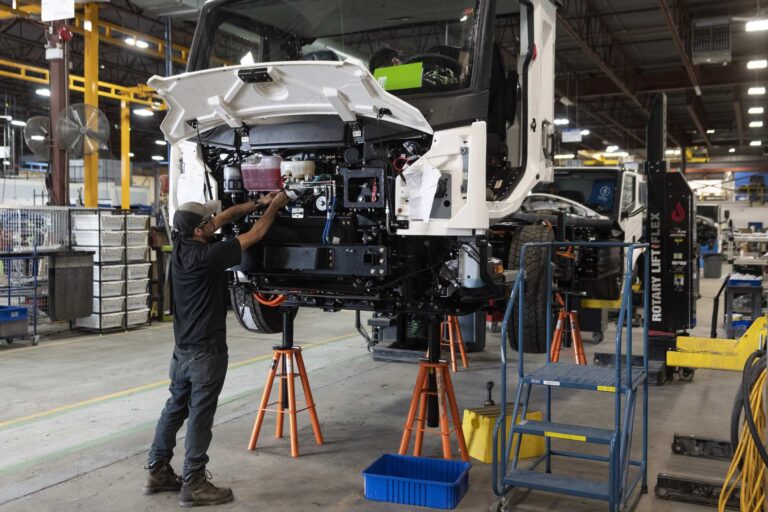MONTREAL — In Europe, the collapse of Swedish EV battery maker Northvolt in March meant shuttered production plants and thousands of job losses. In Quebec, its demise was less dramatic: a 171 barren hectares on Montreal’s South Shore.
This was to be home of the company’s first non-European battery factory, right up until the Quebec government pulled the plug on the project last week.
You might say the province got off easy. Yet by flopping in Sweden, Northvolt stands to have detrimental long-term effects on cleantech investment in Quebec and beyond.
First, the obvious. The Quebec government invested $270 million in the Northvolt project. That investment is now worthless. For context, that is more than enough money to revamp a good-sized hospital in Montreal, train 5,000 new construction workers or purchase just over a quarter of a new roof for the Olympic Stadium. Quebec also loaned Northvolt $240 million to purchase those 171 hectares, with the land itself as collateral, meaning the government must sell it for at least that amount, along with at least $20 million in interest, to make itself whole. Christine Fréchette, Quebec’s economic minister, recently said the government has managed to recoup $200 million, and said there is more coming.
Related Articles
Less obvious, but more profound, is Northvolt’s long shadow on the cleantech industry. Investments in world-saving technologies are in free fall, with the dollar value of Canadian investors’ deals in cleantech and climate-tech was down 45 per cent in 2024 compared to the year before. Granted, this is compared to the pandemic era, when green investment dollars flowed. Now, Trump’s tariffs, combined with its demonization of anything carbon reduction-related, has turned cleantech bulls into bears.
By virtue of its rapid rise and expensive downfall, Northvolt makes for an easy cautionary tale about the folly of cleantech investing. It’s already had an effect in Northvolt’s backyard. “In Sweden, private money is pulling back and becoming increasingly cautious, in large part because of what happened with Northvolt,” Christian Sandström, an associate professor of technology management at Linnaeus University in Sweden, told me.
Quebec’s public-money investments in Northvolt tell a similar cautionary tale. As someone who knows these things told me recently, Quebec public pension fund manager La Caisse de dépôt invested $200-million in Northvolt largely because others, including the Ontario Municipal Employees Retirement System, had already done so. This sounds less like sound investment strategy than dumb money FOMO.
La Caisse has poured roughly the same kind of money into a buzzy sector before, with similarly disastrous results. In October 2021, it invested US$150 million in crypto lender Celsius, while hailing the company as “the leading global cryptocurrency earning and borrowing platform.”Celsius collapsed nine months later. The result? La Caisse wrote off its investment and swore off crypto for good. Will Northvolt’s demise trigger a similar reticence for cleantech investment? Well, Northvolt’s $200-million black eye certainly doesn’t help.
Northvolt’s would-be Quebec home, those 171 barren hectares, also sets a bad precedent. The company was not only able to secure the land with a Quebec government-backed loan; it also circumvented a strict environmental review normally conducted for such massive infrastructure projects.
The land was cleared of trees and protesting environmentalists as a result, all for a $7-billion battery production facility that will never be built. This sends a perverse message to the world: Quebec will roll out the red carpet and ignore its own environmental laws, as long as you’re selling something big, expensive and dripping with hype.
As Europe’s EV battery pioneer, Northvolt sold investors on a compelling narrative. It would challenge China’s dominance in the sector while respecting the environmental norms, democratic ideals and European standards. This narrative has since turned on itself. If anything, Northvolt’s demise has reinforced China’s lock on the market, and rendered cleantech investors gun shy on the prospect of challenging it again.
Update: A statement from Quebec economic minister Christine Fréchette has been added.
Martin Patriquin is The Logic’s Quebec correspondent. He joined in 2019 after 10 years as Quebec bureau chief for Maclean’s. A National Magazine Award and SABEW winner, he has written for The New York Times, The Guardian, The Walrus, Vice, BuzzFeed and The Globe and Mail, among others. He is also a panelist on CBC’s “Power & Politics.”



